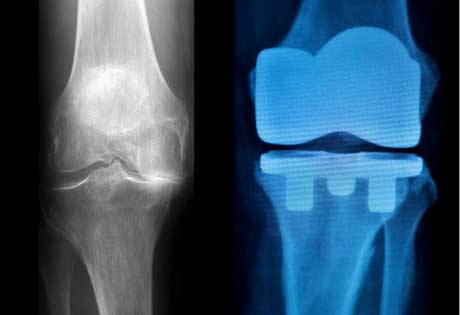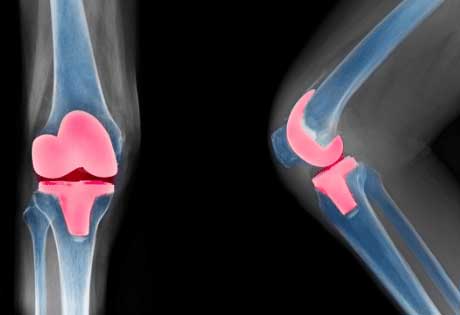Despite the birthday cake, getting old is rarely a cause for celebration. At least physically. Nobody ever said I can’t wait till I’m 70. Many joints ache, your bladder never really feels empty, and a full uninterrupted night’s sleep makes up the bulk of your birthday wishes. If you add stiff, grindy arthritic knees to that equation, it’s easy to see why you don’t like to leave the house without being a little grumpy. So when Total Knee Replacements became a thing, it’s no wonder your eyes lit up like a 30 year old. Finally, a solution to the knee pain that wakes you up multiple times a night.
Questions to ask before you get a knee replacement
So now that this is an option for you, and many others of the vintage disposition, let’s take a deep dive and answer the three main considerations you’ll have to think about before going under the knife.
- Why would I need a Total Knee Replacement?
- What actually happens during the procedure?… and if you qualify
- When is the right time to go under the knife?
Disclaimer: This is for Educational Purposes Only
Let me take a quick intercession to inform you as to the nature of our advice. We are experienced, healthcare clinicians. We wish to share our experience with you on topics to do with your health. We may be a little colourful in doing so, but at the heart of what we do is in-the-trenches experience. Whilst we have achieved academic success and understand the evidence, we are not solely evidence-based. We are, however, EVIDENCE INFORMED.
We find that the evidence is usually 10-15years (at minimum) behind what we are seeing in the clinic. We see real people, with real problems, and we’ve made a great living out of offering real solutions.
If all you’re after is the researched evidence, you can find some on Google Scholar, or you can very easily look for more on Google. We want to give you real-life advice, most of which you may not find in the research.
There is no way that this document can replicate or replace expert assessment and guidance given by a qualified registered healthcare practitioner who has seen you personally. I am sure you’re aware that I have no knowledge of your personal medical history or how you take care of your body. If you require care from a qualified practitioner, you would be best served by seeing someone who can empathise with your situation and treat you accordingly.
I’m sure you understand that I disclaim any and all responsibility for anything you do as a result of reading this document. And by reading this article, you accept 100% responsibility for the actions of you or anyone under your care.
Why you may need a knee replacement?
The main reason why you might need a total knee replacement is basically due to Arthritis. When the top thigh bone (femur) meets the bottom shin bone (tibia), they meet together and connect together through ligaments. The surfaces that meet have a soft cartilage over them (articular cartilage) and a firmer cartilage between them, called the meniscus. This creates your knee joint which is also surrounded by more ligaments that encapsulate the joint and protects it.
Over the majority of your lifespan you will get wear and tear over that joint that is predicted by two main factors, genetics and high impact loading through the joint. Things like running and jumping. If Arthritis develops, even to a moderate amount, that could lead to a lot of grinding, and stiffness and achiness and lots of pain. When that pain gets to a point where it’s affecting your quality of life, where you can’t exercise, and more importantly when you can’t sleep, then it may be time to consider a Total Knee Replacement. Not having this procedure could mean a deterioration of your health due to not being able to function and get around.
What happens during a knee replacement
Okay, now you’re thinking about getting a Total Knee Replacement, it’s important that you actually know what happens during that procedure. So basically when you have a lot of wear and tear on your knee joint and you need to get that joint replaced, they’re going to replace that joint with a combination of metal and plastic. So what they do is they cut and shave back the bottom part of your thigh bone (femur) and replace that with a metallic structure that mimics what the end of that bone used to look like. And then they cut and shave back the top of the shin bone (tibia) and they first put a layer of metal on top of that bone as a base. Then they put another piece of plastic that mimics the way the end of that bone used to look like.
So basically when you’re done, you have a metal structure (top) articulating with a plastic surface (bottom). And that forms the new knee joint. They then stitch you back up, and then they get you going with a rehabilitation program that goes on for anywhere up to 6 months. That particular procedure shows actually really good outcomes. Some studies have shown good outcomes, with satisfaction at about 89%. While showing poor satisfaction outcomes at about 3%. Based on those numbers it’s a procedure we actually recommend if you need it.

Why get a knee replacement
When considering Total Knee Replacements, the WHY part is actually pretty easy. There’s lots of wear and tear, there’s lots of arthritis and there’s an immense amount of pain. The WHAT bit is actually pretty stock standard. The procedure is done well these days, and
you’ll get generally good outcomes. The WHEN question is actually a harder question to answer. When should I get the knee replacement? How long should I wait until I consider Total Knee Replacement?
The conventional wisdom is that you wait it out as long as possible. You wait until you can’t bear the pain anymore, and then you go and see your surgeon and he does it for you. I have a problem with that particular piece of advice because I don’t like the fact that people become deconditioned. If you wait 6 months, 1 year too long, there’s every likelihood that you can lose a lot of muscle, and that could have detrimental health effects on other parts of your health.
If you have respiratory conditions, or diabetes, high cholesterol, even weight gain, it is probable that these conditions will get worse because you’re not moving around as much and you’re not sleeping as well because the pain is keeping you up at night. My advice to you is do not wait until you become deconditioned. If there’s a moderate amount of pain, and you go and see your surgeon, elect to have the surgery done. It’s a good surgery that will give you good outcomes. Obviously discuss these things with your surgeon, but please make them aware that you want to live the later parts of your life with total quality, not just knee quality. Most top surgeons do take this into consideration.
Now that you have some insight into what is a life changing procedure, enjoy your birthday cake and begin to make some birthday wishes that don’t revolve around pain. And you can sleep a little better knowing it will take much more to kill you than a bad pair of knees.
If you feel that any of the information we’ve given you here resonates with you and you feel we are in a position to help, please BOOK ONLINE as we would welcome the opportunity. If you feel that we can help you in any other way, please reach out to us via our CONTACT PAGE.

Dr. Sami Karam, Osteopath
I’ve been a qualified Osteopath since 2004. I’ve been playing football ever since I could remember and I have a passion for it. I’ve played at the highest level in the NSW State League at both Youth and Senior levels, and have also been Head Physician at numerous State League Clubs. I’ve travelled internationally and consulted with Sports academies in Barcelona and Italy. I have a special interest in Strength and Conditioning for footballers, as I believe it gives them an edge in their physical competition. My passion involves bringing all of this knowledge into every single treatment that I provide for all athletes. If you feel that I can help you and want to reach out to me, contact me.



